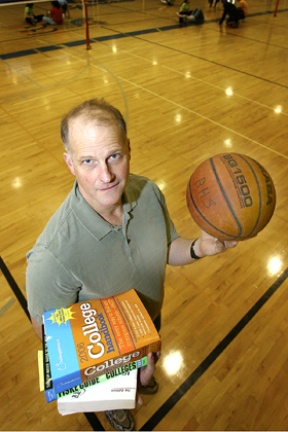Bruce Beall wants to help athletes continue with sports.
There are some high school student athletes who know which school they want to go to, earning a scholarship to the college or university of their choice.
Some athletes are among the select few who go through a recruiting war for their services.
But there are many students who don’t want to stop playing their favorite sport, but need help navigating the massive amounts of paperwork and the web of NCAA regulations that can leave their heads spinning.
Some athletes stop playing in college because they can’t get into a school of their choice because the number of applicants is much greater than it was 30 years ago.
Bruce Beall wants to be their guide through the many labyrinths and help them stand out so they can continue playing the sport they love and get a good education.
“If they enjoy playing lacrosse or rowing or swimming or whatever, they can have just as much fun doing it in college,” he said. “There’s advantages to being an athlete in college, with getting (the) classes (you want) and (preference on) dorm rooms. So there’s a lot of good reasons for kids to continue and a lot of kids don’t.
“There’s many opportunities to continue in Division II or Division III. It can help them get into school and sometimes it can help them financially.”
Beall works for the Varsity Student Institute, a company that provides consulting services for student-athletes and their parents to work through the numerous regulations and choose the school they feel is right for them.
VSI, based out of Bellevue, isn’t a recruiting service where they act as agents or send out a blanket of info to all schools.
Instead, they gauge a student’s interest and put together a program specifically tailored to their client to best showcase them and their abilities.
They show the student how to get their name and face out to athletic programs – whether calling the coach or that may not have the time or the money to look for all the good players that fall through the cracks.
VSI also works with the student to prepare a cover letter, an essay, work through a college application, apply for financial aid and prep work in the various exams needed to qualify for college.
“It helps forces kids to do it themselves,” Beall said. “The coaches don’t want to talk to the parents or me, they want to talk to the kids. So its really teaching the kids to be proactive in the process.”
Beall started with VMI five years ago when founder Scott Brayton approached him about working together.
Beall, a former high school swimmer and star rower for the University of Washington and U.S. National team in the 70s and 80s, was running the George Pocock Rowing Foundation, a non-profit foundation which helped high school rowers continue their career in college.
“He came in the door one day and said, ‘Hey, have you thought about this for rowing?’” he said.
The two kept working together and started the business shortly after to expand it to other sports.
The hands-on approach with students comes from their experience with the recruiting process in college, as Beall coached at Boston University, Harvard University, M.I.T and the University of California in Berkeley.
“I liked coaching but what I didn’t like was the recruiting aspect of it,” he said. “From a coaches’ perspective, it’s a black hole of time. You can always write another letter, you can always make another phone call, you can always contact a friend that’s a high school coach to see if there’s another kid out there.
“That’s what I talk about with the kids and the groups I work with,” he continued. “Most coaches don’t get into coaching to recruit. It’s a necessary evil, but it’s part of the job.
“So what we teach the kids is how to be proactive in the process. They’re providing information and they’re showing interest in the program. So it’s about self-promoting yourself and doing it around all these funny NCAA rules.”
To that end, Beall makes sure the student is front and center with the whole process to make sure they – and no one else, not even their parents – make the right choice for the school they want.
“In some ways it’s a life skills class, but it’s orientated around this thing called college,” Beall said. “So how does a kid with a 3.6 (GPA) and high scores on the SAT distinguish themselves? Well a sport can help them. It shows they’re committed and they can set goals.”
For a consultation, visit www.go-vsi.com or contact Beall at bruce@go-vsi.com.



